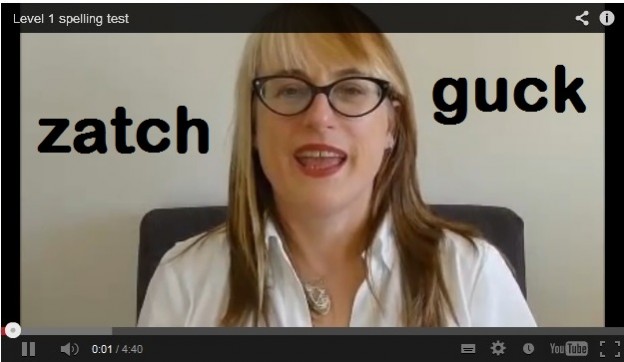Updated spelling tests
2 Replies
Last month, the Australian Bureau of Statistics released its 2011-2012 adult literacy survey, which found that 44% of adults don’t have good enough literacy to cope with the complex reading and spelling demands of modern life.
This means very little has changed since the first such survey in 1996, when 46% of adults were found to be struggling, despite the millions of dollars that have been poured into adult literacy programs since then. How depressing.
Reading about the new data has motivated me to update my website’s non-word spelling tests, and add introductory videos for both adults with literacy difficulties and parents concerned about their child’s literacy.
What are these tests for?
There are two main types of spelling test:
- Standardised tests that treat spelling as a developmental skill, and are designed to determine whether a learner is keeping up or falling behind their peers. These tests yield things like Age-Equivalents, Percentiles and Standard Deviations from the Mean, and allow a learner’s skills to be compared with others their age.
- Non-standardised, exploratory tests that treat spelling as a learned skill, and are designed to work out what a learner knows and doesn’t know, in order to work out what they need to learn next.
The Spelfabet Nonword Spelling Tests are the second type of spelling test. Each level is related to a series of free spelling lists, a workbook and some games on this website.
I also plant to start working through the big resource lists under Phonics Resources, matching them to my test/lists/materials levels, so it’s easy for everyone to work out which materials are most likely to be appropriate for which learners.
Why non-words?
These spelling tests are composed entirely of non-words, so they expose a learner’s skills and weaknesses at two key literacy sub-skills – ability to hear sounds in words (phonemic awareness) and spelling pattern knowledge (phonics).
On spelling tests made up of real words, difficulties with phonemic awareness and spelling pattern knowledge can be masked by good visual memory for whole words.
What’s changed?
I’ve taken out the narrative and the silly hats (I think I spend far too much of my life trying to make children laugh) thus making them more suitable for any age group, including adults.
I’ve also fixed up the numbering error in the Level 7 test that my colleague Maggie pointed out (thanks Maggie!) cut the length of the Level 6 test, and made a few other fairly minor changes.
You can get to all the tests from this page.
Any feedback?
I hope these improvements all seem like improvements to you too, and that you find the tests useful in pinpointing gaps in spelling code knowledge, and finding suitable materials to fill them.
I’d love to hear any feedback you have about these tests, so if you have any, please email it to spelfabet@gmail.com.



Do you recommend the SA Spelling test?
Hi Diane, I have the SA Spelling test but I don’t use it myself, it has been in circulation for a long time and I’ve found that sometimes kids with quite poor spelling can still do quite well on it as they have done it many times. However, like any assessment tool, it could be useful in the hands of a skilled and experienced person who understands the reading science.